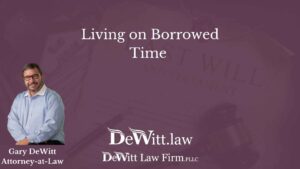Living on Borrowed Time Rogers Estate Planning

Living without a plan is living on borrowed time
1 in 3 people will become disabled or worse before retirement age. Those odds are simply too high to ignore.
If you become incapacitated – unable to make your own legal, financial, and healthcare decisions – due to accident, health incident, drugs, or alcohol you family may have to seek a guardianship in court!
A guardianship is also sometimes called “living probate.”
You can think of a guardianship as a limited power to oversee and assist you with your affairs, under court approval.
Guardianship are public record!
If you and your spouse (or children) own things together, they will need a guardianship to be able to access accounts (like a 401(k) or IRA) or sell real estate if needed. It doesn’t matter if you have setup a beneficiary on the account because that only takes effect on death.
Mary never expected her husband John to have a major stroke when he was only 53. John pulled through but was left with enough mental deficits that he needed help managing money and making healthcare decisions. He was also left with a few physical deficits that made climbing stairs difficult.
Mary needed to sell the house to downsize and get a single level home that was easier to get around in.
Mary had to, at an expense of time and money:
1. Hire an attorney to get a guardianship ($$$$$)
2. Go to court to get a ruling on the guardianship petition
3. Get 3 appraisals on the property ($$$)
4. Petition the court (ask for permission) to sell the house ($$$)
5. Sell the house
6. Report to the court with the sales information in it ($$)
7. Report annually to the court how the money was used ($$)
8. Repeat as needed
9. If John needs Medicaid, hope the Judge will approve the Medicaid plan